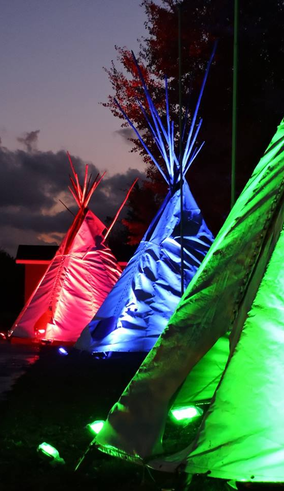Mi’kmawey Green Communities Program - Bear River Harvesters Gathering
- Location: Bear River First Nation, Nova Scotia
- Project Partners: The Confederacy of Mainland Mi’kmaq – Mi’kmawey Green Communities Program
|
Project Description
The Mi’kmawey Green Communities Program’s (MGCP) objective for this event was to develop a solid waste management plan and staffing for the event. This meant reducing the amount of waste generated, reducing associated fees, mitigating environmental impact(s) and developing tools for community administrators to effectively and sustainably manage solid waste during large events. In order to achieve these goals, The Mi’kmawey Green Communities Team set up three (3) stations for waste in the following high traffic areas, vendors tent, Community hall, and the cook house. These stations included four roll carts:
All roll carts were labeled with the proper signage. The four roll out carts were to accommodate all three streams of waste as per the Bear River sorting guide and Valley Waste Resource Management. The team also set up sorting stations inside the facilities that didn’t already have them and supplied blue and clear bags as well as compost bags. |
To end the event the community had a closing feast. To manage the waste from this portion of the event the MGCP team set up a waste sorting station to ensure that everyone was bringing the waste from their meal to one location for disposal. This waste sorting station included all streams of waste and served two purposes. One was to help educate individuals on how to properly sort waste, and secondly, to ensure that all the waste from the event was sorted properly.
To dispose of all event waste, there were three dumpsters on site a compost, recycling and garbage dumpster.
During the event the Mi’kmawey Green Communities Team and a community volunteer did the following tasks:
To dispose of all event waste, there were three dumpsters on site a compost, recycling and garbage dumpster.
During the event the Mi’kmawey Green Communities Team and a community volunteer did the following tasks:
- Monitored the waste stations helping sort the waste and educating individuals on sorting practices with regards to the Bear River Sorting guide.
- Empty roll carts and bins when full.
- Replace supplies when low.
- Set up a sorting station for the closing ceremony/ feast.
- One on one education with community members anything regarding waste.
Project Results:
- Reducing the amount of waste generated
- With proper diversion, the event generated 150 KG of garbage. If the waste wasn’t sorted 690 KG would have gone to the landfill.
- Reducing associated fees
- The waste fees were reduced by 18.4% from proper sorting of waste.
- Garbage was charged at $0.121/KG
- Recycling was charged at $0.097/KG
- Compost was charged at $0.096/KG
- The waste fees were reduced by 18.4% from proper sorting of waste.
- Mitigating environmental impact
- 540 KG of waste was diverted out of the landfill.
- Developing tools for community administrators to effectively and sustainably manage solid waste during large events.
- Bear River First Nation recognized the benefit of having the waste properly managed at this event. Working together, MCGP and Bear River developed a plan, budget and materials necessary to successfully carry out the SWM plan to ensure the waste was not only sorted correctly but also was aligned with Bear River’s values on environmental stewardship. Both parties learned what kind of people-power and resources are required to carry out this type of project and hope that the relationship will continue in the future. MGCP was happy to be apart of this event and support the Community in their waste management goals.
Project Outputs:
- The overarching initiative of this event was to reduce waste, costs, environmental impact and enhance Community capacities.
